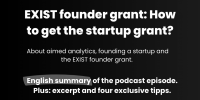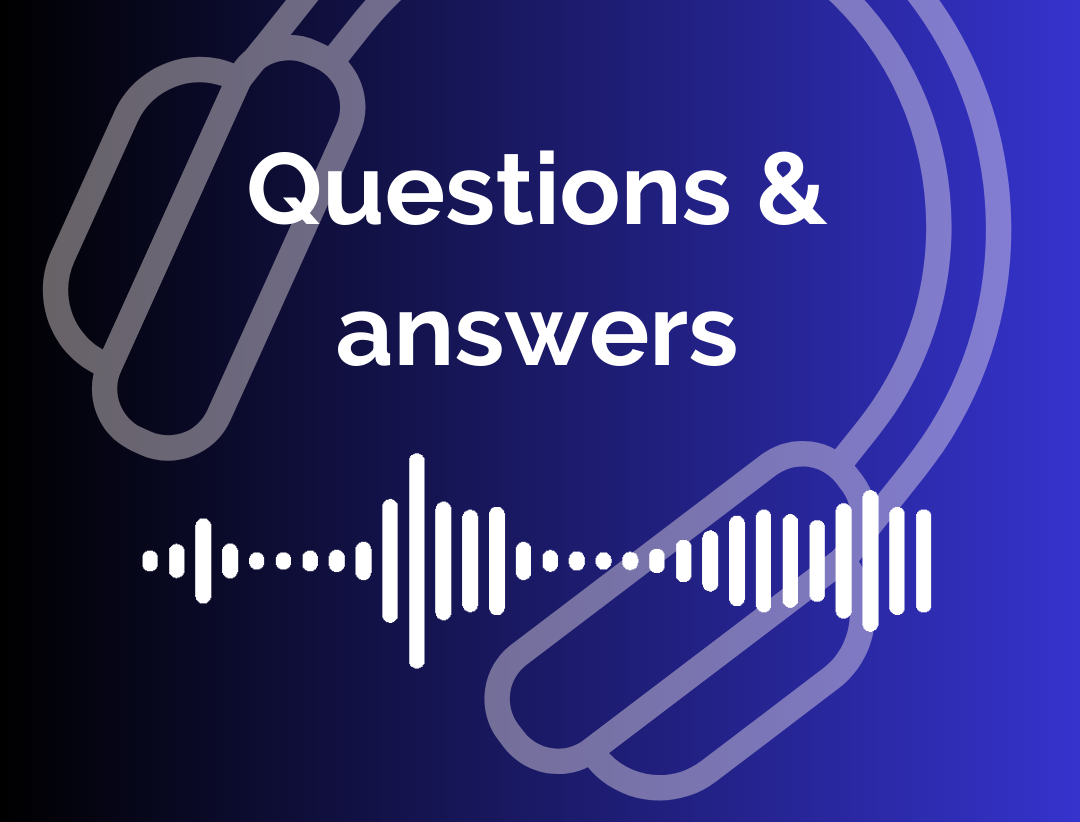
How the EXIST founder's grant works
In the latest episode of the StartUpWissen podcast, our Co-Founder Kevin shares insights on the key requirements for an EXIST-Gründerstipendium (founder fellowship) in Germany. OUT NOW! Here, we give you a glimpse of the German interview in English, tell you a bit about the founder fellowship, and also give you tips along the way.
In the latest episode of the StartUpWissen podcast, our Co-Founder Kevin shares insights on the key requirements for an EXIST-Gründerstipendium (founder grant) in Germany. OUT NOW!
Here, we give you a glimpse of the German interview in English, tell you a bit about the founder fellowship, and also give you tips along the way.
In the episode, Kevin talks to Editor-in-Chief Jürgen Kroder about how the EXIST founder grant played a crucial role in the founding of aimed analytics. If you want to start a business, are currently living in Germany and thinking about applying for the EXIST founder grant, you should definitely read this summary or, if you understand German, listen to this podcast episode. You'll gain valuable insights into the key requirements of the funding program and learn from real-world experiences.
You can listen to the episode on multiple platforms, including Apple Podcast, Google Podcasts, Spotify, Deezer, Podigee, Youtube and even via Alexa or Amazon Echo. And, of course, here.
An excerpt from the interview
Jürgen: You want to implement an innovative idea and perhaps need a little start-up financing? No problem! Then you should take a look at the EXIST-Gründerstipendium. In this episode of the StartUpWissen podcast, you'll find out what it is and how it works.
And hello, welcome to a new episode of the StartUpWissen podcast. My name is, as always it must be said, Jürgen Kroder, and today I've got Kevin Baßler in front of the mic, and we're talking about the topic of EXIST-Gründerstipendium.
I think this is a very important and exciting topic, because it helps young founders, students in particular, to found and advance a start-up. So, before I get too deep into the topic, I would say, dear Kevin, please introduce yourself briefly: Who are you and what do you actually do?
Kevin: Hi, Jürgen. Thank you very much for the invitation. Yes, as I said, my name is Kevin Baßler. I'm actually a biomedical scientist, I did my doctorate in this field in 2020 - and after my doctorate I first worked as a freelancer in the field of data analysis and then, over the course of the last two years, I decided to found my own start-up in this field. And that's what I did with the EXIST start-up grant.
Jürgen: Yes, wonderful, thank you very much for your short introduction. What is the name of your start-up?
Kevin: Our start-up is called aimed analytics. And in January we also founded aimed analytics GmbH.
Jürgen: Wow, so it's still very, very fresh. It's March right now when we're recording this episode. What are you guys doing?
Kevin: Exactly, so our main focus is medical data analytics. And our customers are pharmaceutical customers who bring data and have certain questions, like: Why does one drug work for one patient and not the others? And in order to answer those questions, we apply different analytics from the machine learning area to be able to answer exactly the customer's questions.
Jürgen: Yes, you're in some very hot areas there. On the one hand, Machine Learning or AI, as it's always called, Artificial Intelligence. Data analysis - there was also an episode on this here on the StartUpWissen podcast. And then of course, yes, biotech, I'll say in a broader sense, that's actually also totally hot.
Kevin: Definitely, yes!
Jürgen: Yes, then you already have a good basis. But until you got here, you first had to start, of course, and then you used the EXIST-Gründerstipendium. What is that actually?
Kevin: The EXIST-Gründerstipendium is funded by the German Federal Ministry of Economics and Climate Protection. And it's a grant that helps young teams to evaluate their idea - their start-up idea, to develop it, and then following the funding hopefully lead them to found, like we did.
Jürgen: And the founders or the people who get together to test an idea, they're always students then or they always have to be students to get this grant, right?
Kevin: Exactly, so the regulation when we applied - and I don't think anything has changed in the meantime, we applied in 2021 - the regulation was that you have to be out of university for at least or at most three years to be able to apply, but ideally you're still enrolled or you've just finished your degree.

Other topics from the podcast episode and info for founders
How much money do I get?
As a student who has completed his doctorate, you got 3,000 euros for twelve months, after a university degree (Bachelor) 2,000 euros and as a student 1,000 euros. In addition, 30,000 euros in material resources (from a catalog of what is eligible, e.g. visiting trade fairs, developing prototypes) and 5,000 euros in coaching resources.
Upper limit - do you get ten times this amount with ten people?
No. We were three members and at the time the recommendation was that three people per team could be funded.
Do you get the money completely for free?
Yes.
Who gets this scholarship?
You have to apply for it and the application requires that you submit a so-called idea paper (a slimmed-down business plan). It took our team half a year to develop a proper idea paper in advance.
Is the pot of money limited or relatively open?
The pot is limited, you have high competition.
What is the idea paper?
A kind of business plan. You describe your idea, the innovation, the unique selling proposition, do a market analysis, deal with the competition, and analyze strengths and weaknesses in the team (SWOT analysis).
Are there templates?
We did not have a template, but an outline. And a guideline as to how long the idea paper should be. You have to keep it to the point, but it is still a relatively large amount of writing. It's not like you just have an online application and click on a few things.
How do you submit the paper?
We, or rather the university, submitted the ideas paper online on a platform. And we also submitted the application by post.
Do you need a patron?
Yes, the university is the applicant. The prerequisite is that you define a mentor for the project application. The mentor has also been an essential part of our project.
Is the mentor also a coach?
Yes, our mentor was also involved in the application process. In our case, it was a start-up consultancy at the University of Bonn (The Transfer Center enaCom), which focuses on supporting students and graduates to start their own business. The consultancy helped us with the application and submitted it.
What other considerations are there?
There is a point list of tips available on the website. Essential that team shows they are actually capable of executing the idea.
Does the project have to be related to studies?
It is very welcome that the team is not only completely from the field of study. Ideally, there is also someone on the team who knows about business. This is more of an advantage than a disadvantage. But part of the team has to have the technical skills to drive the idea forward. If you say, "I'm doing something with machine learning in this project now," but no one on the team has ever done anything with machine learning before, then no one believes it.
What percentage of your working time do you have to spend on EXIST?
For us, it was five hours a week that we were allowed to do something else. The rest of the time we spent completely on the EXIST project.
Do I have to found a company or submit a finished prototype after 12 months?
It is not necessary that you are then immediately ready to found or that your prototype is completely finished. One submits a report of results and requires a business plan. One develops a mindset even if the company has not yet been founded or even if it is not to be founded immediately. We developed our prototype further after the project and also founded our company ourselves later.
Four exclusive tips
Four exclusive tips from our Co-Founder Kevin:
- Tip #1: Find a strong team. Invest time and really think about who you want to go on this journey with. This is similar to a marriage, it's essential that the team members are strong and get along well.
- Tip #2: Use your network at the university to write the idea paper as well, for example.
- Tip #3: Define a realistic goal. Try to really say where do you want to go with EXIST. Do not lose focus.
- Tip #4: During EXIST you will come into contact with many startups. Ideally, build your network in advance and talk to other startups, get into the whole startup network.